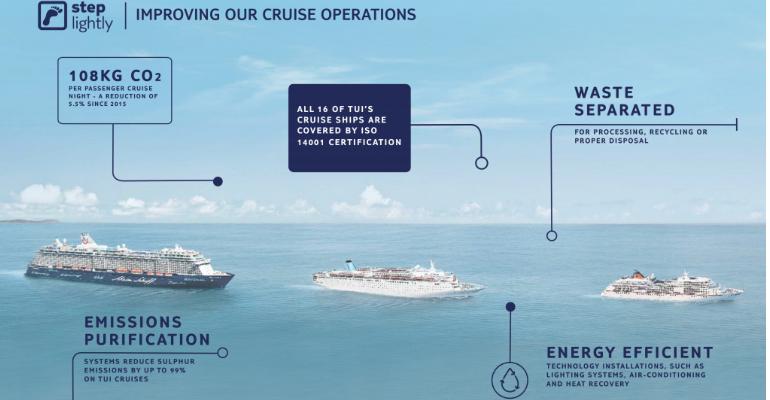Between 2015 and 2019, carbon efficiency from cruising improved by 14%. The three newbuilds entering the fleet by 2026 will not use heavy fuel oil.
Mein Schiff 7 will enter service in 2024, running on lower-emission marine diesel and will be equipped with catalytic converters and a shore power connection. The ship will also be able to run on green methanol in the future.
In 2024 and 2026, two ships will follow, which will run on LNG. This will serve as a bridge technology until bio-LNG is available, produced either from biogenic sources or synthetically from renewable energy.
Net zero goal
‘TUI is to become the climate pioneer in our industry,’ said TUI Group CEO Sebastian Ebel. ‘The next milestone is 2030. Our emission reduction roadmaps reflect the state of knowledge and technology today. However new tech solutions for climate protection are being developed every day. We won't wait for them, but we will use them to accelerate our progress.
‘Net zero as quickly as possible is our most important goal in terms of sustainability. We will also communicate this to suppliers and partners. Anyone who works with TUI must be prepared to pursue ambitious goals and walk the path with us.’
Andrew Flintham, MD TUI UK and Ireland added, ‘Our customers already fly on the world’s most carbon-efficient airlines and support development, prosperity and cultural wealth around the world. They can also be assured we are committed to future proofing the planet and tackling climate change head on with a clear road map rooted in industry leading science-based targets across all elements of their holidays from flights to cruise ships to hotels…’
The remarks came as Ebel presented TUI Group’s sustainability agenda. The three building blocks of the agenda, ‘People, Planet and Progress,' are underpinned by 15 focus areas to be implemented across the business, as it aims to achieve net-zero emissions well ahead of 2050 and science-based targets by 2030. TUI plans to offer climate-neutral cruise holidays by 2030 at the latest and its cruise business – TUI Cruises, Hapag-Lloyd Cruises and Marella Cruises – has reduction targets approved by the Science Based Targets initiative, a collaboration by the UN Global Compact and WWF, among others.
Targets backed by science
Of the targets set by TUI Group, Ebel commented, ‘These scenarios were made on the basis of today's scientific findings and the technologies and fuels available today. New technology and innovations will continue to open new possibilities and will spur us on to be more ambitious. That's why we will keep reviewing and adjusting our targets…’
Minimising waste
TUI will endeavour to transform the way it uses resources with its initial focal on waste from plastics and food. TUI Group aims to eliminate unnecessary plastic packaging and items by 2025, building on its pre-pandemic plastic reduction program. By 2019, the company had already removed more than 257m single-use plastic items from its hotels, cruise ships, airlines and offices.
In addition, the company set the goal of reducing food waste in its hotels, on cruises and airlines by 25% by 2030. It is leveraging the experience gained from pilot projects, such as the food waste pilot project on board TUI Cruises ships. More initiatives are to follow.
Copyright © 2024. All rights reserved. Seatrade, a trading name of Informa Markets (UK) Limited.
Add Seatrade Cruise News to your Google News feed.  |

